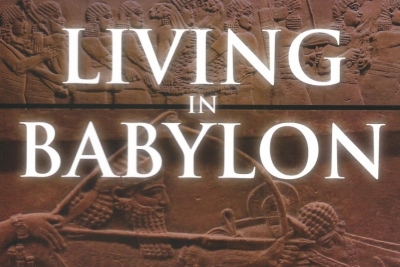Last week we said that Judaism as we know it today was not developed in Jerusalem but in Babylon. The same is true of the practice of Sabbath observance which, although it was part of God’s act of creation and commanded in the Torah, was actually developed and integrated into Jewish national life in Babylon.
Genesis 2:2 says “By the seventh day God had finished the work he had been doing; so on the seventh day he rested from all his work. And God blessed the seventh day and made it holy” – that is – different from the other days of the week. Moses was told to make Sabbath observance part of the law to be observed by the people of Israel. “Say to the Israelites, you must observe my sabbath. This will be a sign between me and you for the generations to come, so that you may know that I am the Lord, who makes you holy” (Ex 31:13).
During the time of Moses’ leadership on the journey between Egypt and the land of Canaan, the observance of the seventh day as a day of rest also became a day of sacred assembly. Moses was told to say to the people “There are six days when you may work, but the seventh day is a sabbath of rest, a day of sacred assembly. You are not to do any work; wherever you live, it is a sabbath to the Lord” (Lev 23:3).
Presumably this last statement was looking ahead to the settlement in the Promised Land, where the sabbath rest was extended from people to the land itself: “In the seventh year the land is to have a sabbath of rest, a sabbath to the Lord” (Lev 25:4).
Sabbath observance, although part of God’s act of creation and commanded in the Torah, was developed and integrated into Jewish national life in Babylon.
The Sabbath Lost
There is no evidence of sabbath observance in the history of Israel after the settlement in the land, which was one of the major complaints of Jeremiah. He went and stood in each of the gates of the city of Jerusalem to see what was happening on the seventh day and it appeared to be like any other day, with merchandise coming and going through the gates.
So Jeremiah said, “Do not bring a load out of your houses or do any work on the sabbath, but keep the sabbath day holy, as I commanded your forefathers. Yet they did not listen or pay attention; they were stiff-necked and would not listen or respond to discipline” (Jer 17:22- 23).
Ezekiel took up Jeremiah’s complaint. He declared that the priests were despising the law because they were profaning the things that God had declared to be holy: “They do not distinguish between the holy and the common; they teach that there is no difference between the unclean and the clean” – which even extended to shutting their eyes to the breaking of the sabbath (Ezek 22:26).
Ezekiel listed the desecration of the sabbath among the reasons that led to God’s decision to withdraw his covering of protection over Jerusalem: “‘I looked for a man among them who would build up the wall and stand before me in the gap on behalf of the land so that I would not have to destroy it, but I found none. So I will pour out my wrath on them’…declares the Sovereign Lord” (Ezek 22:30-31).
Both Ezekiel in Babylon and Jeremiah in Jerusalem warned the people that God would withdraw his protection and allow Jerusalem to be destroyed unless the people turned from their idolatrous practices and repented – which included repenting their desecration of the sabbath. As soon as the Temple was destroyed, Ezekiel had to help the people to find new ways of worshipping God, which included family prayers around the table at the sabbath evening meal.
When the Temple was destroyed, Ezekiel had to help the people to find new ways of worshipping God, which included family prayers around the table at the sabbath evening meal.
The Sabbath Found
The Babylonians, who were highly religious people, respected the request of the exiles from Judah for the observance of the seventh day as a holy day. So, observation of the sabbath began in the homes of the exile village communities. It provided a day of rest from routine work and an opportunity to pray and to recite and learn portions of the Torah.
Gradually these home meetings led to the desire for meetings of the village community on Saturdays, where they came together under the leadership of the elders in the local meeting place (knesset). So, the practice began of coming together to listen to readings from the scrolls of the prophets of Israel that had somehow reached Babylon in addition to readings from the Torah. A time would be given for the local elder to share with the village the teaching he had received when sitting at the feet of Ezekiel and any prophetic word from the Lord. In time the meeting came to include the singing of a Psalm and time would have been allowed for prayers, so the Sabbath became a day of worship as well as a day of rest from work.
The Sabbath as we know it today was born in Babylon.
This article is part of a series. Click here for previous instalments.
